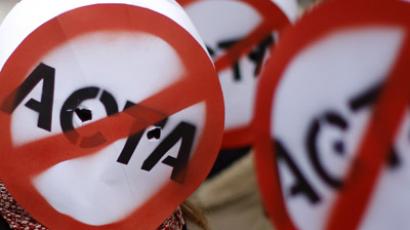'Assange embassy row distracting from whistleblower cause'
The diplomatic standoff surrounding Julian Assange draws far too much media attention, Loz Kaye, the leader of the UK Pirate Party, told RT, adding that WikiLeaks must focus on its primary activities despite Assange's legal wrangles.
RT: These so-called Syria Files that are currently being published on WikiLeaks consist of around two and a half million emails from Syrian political insiders. What sort of information could they reveal, and will this leak have any real and timely impact?Loz Kaye: Well, it is very useful to see WikiLeaks getting back and focusing on its real mission. And that is about opening up governments and actually really revealing useful information. We’ll have to see what it brings. Unfortunately, the ongoing case and embassy standoff is continuing to actually take focus away from the work of the whistleblowing organization, and actually I think at the moment is making it increasingly difficult. RT: Let’s talk about the embassy standoff. There he goes to Quito, a call for help from the Latin American country. He is asking for help from a country that is actually now under question about its own media freedom. Do you think in some way he is compromising his position there by going to Ecuador?LK: Well, this has been very much of a concern. It is interesting to see that we are still very much coming back to square one in that embassy standoff now, because there has been an ongoing diplomatic spat between Ecuador and the United Kingdom. Particularly about the message that UK authorities sent about the 1980s law which actually gives UK authorities powers to enter embassies under certain circumstances. This was a taste of what was very much interpreted as a threat. But now there seems to be rowing back from this situation. Now William Hague, the foreign minister, has said that there is no plan to storm the embassy, but equally that the UK is still under obligation to arrest Julian Assange. So, I’m seeing these two things that are kind of canceling each other out right now.RT: Assange also said in his latest interview that his organization is resisting the transformation of the developed world into a transnational surveillance state. If there is any truth to this, what can WikiLeaks do to stop it from happening?LK: One on the recent revelations coming through WikiLeaks has been about the Trapwire surveillance system, which has actually very significant implications also here in the United Kingdom. The trouble is that at this very moment it is very difficult to get this message out while the current standoff continues. But yes, there are widespread concerns which we in the Pirate Party were also articulating for some time now. Here in the UK we are under threat of a major new bill which is actually threatening to track how we send emails, web contacts, and messages to one another. RT: Do you think WikiLeaks can survive without Assange now, or will we see organizations like yourself taking its place?LK: What we’ve been very much saying all along is that it is actually vital that we separate out the personalities from the actual mission. The WikiLeaks social media output has been running some personal attacks right now, which are actually very unhelpful and undermine its credibility as a news organization, which it has always said that it is. But that’s to say that must not distract from the ongoing fight that encouraged us to have a greater transparency and greater power of freedom of information. That’s necessary here in the UK, but also right across the world.














